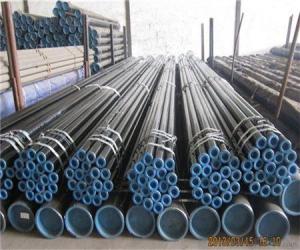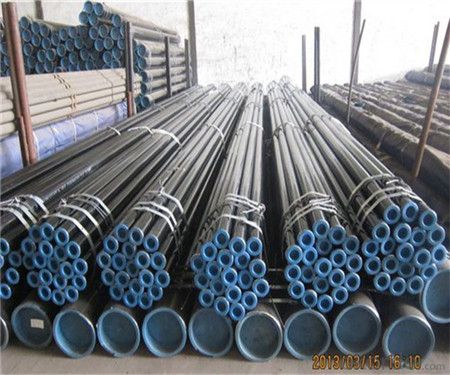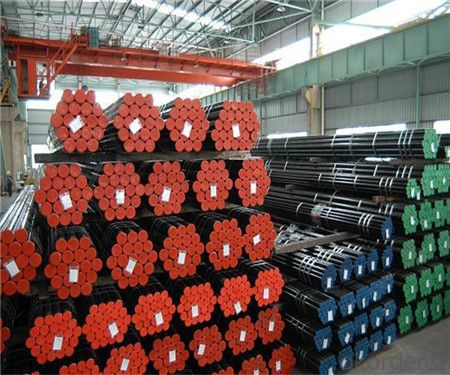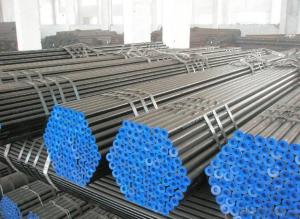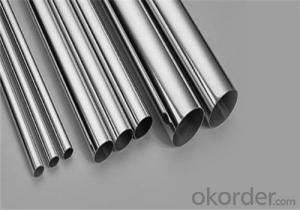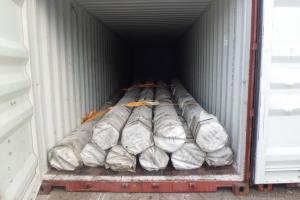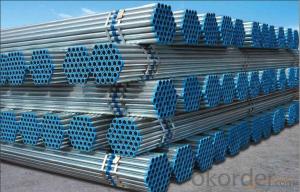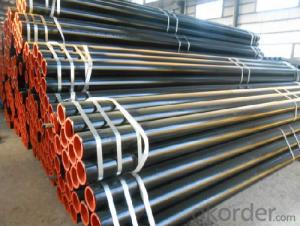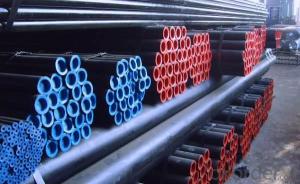Seamless Steel Pipe ASTM A179, ASME SA179 China Supplier
- Loading Port:
- Tianjin
- Payment Terms:
- TT OR LC
- Min Order Qty:
- 20 m.t.
- Supply Capability:
- 9000 m.t./month
OKorder Service Pledge
OKorder Financial Service
You Might Also Like
Product Description:
1、Structure of Seamless Steel Pipe ASTM A179, ASME SA179:
Seamless pipe is formed by drawing a solid billet over a piercing rod to create the hollow shell. As the manufacturing process does not include any welding, seamless pipes are perceived to be stronger and more reliable. Historically seamless pipe was regarded as withstanding pressure better than other types.
Standard: ASTM A179, ASME SA179: Cold-Drawn Seamless low Carbon Steel
Tubes for Boiler and Super heater
● Application: for heater, cooler and heat treatment exchanger
● Steel Grade: A179, SA179.
2、Main Features of Seamless Steel Pipe ASTM A179, ASME SA179:
• High manufacturing accuracy
• High strength
• Small inertia resistance
• Strong heat dissipation ability
• Good visual effect
• Reasonable price
3、Seamless Steel Pipe ASTM A179, ASME SA179
Specification:
Standard | GB, DIN, ASTM ASTM A106-2006, ASTM A53-2007 |
Grade | 10#-45#, 16Mn 10#, 20#, 45#, 16Mn |
Thickness | 8 - 33 mm |
Section Shape | Round |
Outer Diameter | 133 - 219 mm |
Place of Origin | Shandong, China (Mainland) |
Secondary Or Not | Non-secondary |
Application | Hydraulic Pipe |
Technique | Cold Drawn |
Certification | API |
Surface Treatment | factory state or painted black |
Special Pipe | API Pipe |
Alloy Or Not | Non-alloy |
Length | 5-12M |
Outer Diameter | 21.3-610mm |
Grade | 20#, 45#, Q345, API J55, API K55, API L80, API N80, API P110, A53B |
Standard | ASME, ASTM |
1) Material:20#(ASTM A 106/A53 GRB.API5LGRB,GB),45#,16Mn,10#.
2) Specification range:OD:21.3-610mm,WT:6-70mm,length:6-12m or according to the requirement of clients.
3) Excutive standards:GB,ASME API5L.ASTM A 106/A53,Despite of the above standards,we can also supply seamless steel pipe with standard of DIN,JIS,and so on,and also develop new products according to the requirements of our clients!
4) Surface:black lacquered,varnish coating or galvanized.
5) Ends:Beveled or square cut,plastic capped,painted.
6) Packing:bundles wrapped with strong steel strip.
4、Packaging & Delivery
Packaging Details: | seaworthy package,bundles wrapped with strong steel strip |
Delivery Detail: | 15-30days after received 30%TT |
5、FAQ of Seamless Steel Pipe ASTM A179, ASME SA179:
①How is the quality of your products?
Our products are manufactured strictly according to national and internaional standard, and we take a test
on every pipe before delivered out. If you want see our quality certifications and all kinds of testing report, please just ask us for it.
Guaranteed: If products’ quality don’t accord to discription as we give or the promise before you place order, we promise 100% refund.
②How about price
Yes, we are factory and be able to give you lowest price below market one, and we have a policy that “ for saving time and absolutely honest business attitude, we quote as lowest as possible for any customer, and discount can be given according to quantity”,if you like bargain and factory price is not low enough as you think, just don’t waste your time.Please trust the quotation we would give you, it is professional one.
③Why should you chose us?
Chose happens because of quality, then price, We can give you both.Additionally, we can also offer professional products inquiry, products knowledge train(for agents), smooth goods delivery, exellent customer solution proposals.Our service formula: good quality+good price+good service=customer’s trust
SGS test is available, customer inspection before shipping is welcome, third party inspection is no problem.
● Professional teams ensure a high efficiency of your purchase
▲ Professional sales team
▲ Professional engineering and technology team
▲ Professional exportation and contract processing/management team
▲ Professional cooperators and partners
6、Seamless Pipe ASTM A179, ASME SA179 Images:
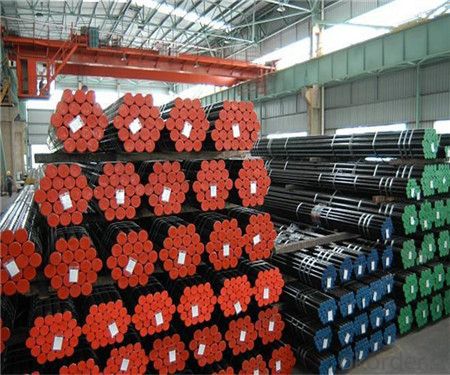
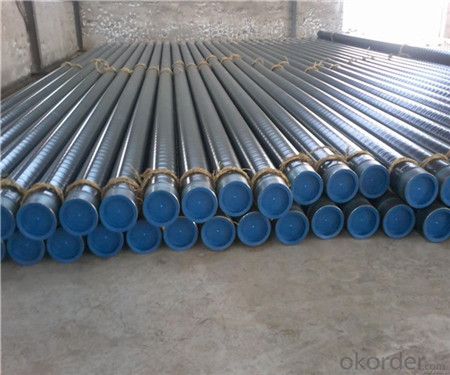
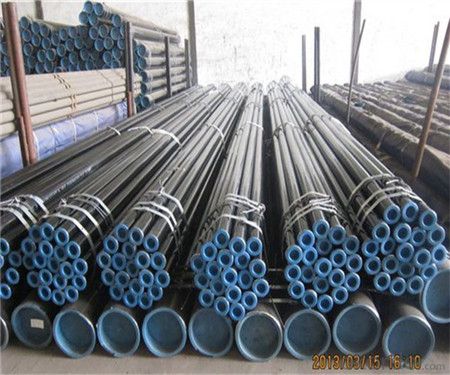
- Q: How do you determine the maximum allowable stress for a steel pipe?
- To determine the maximum allowable stress for a steel pipe, several factors need to be considered. Firstly, the type of steel used in the pipe is crucial as different types of steel have different mechanical properties and strengths. Secondly, the dimensions and thickness of the pipe play a significant role in determining its maximum allowable stress. Thicker pipes generally have higher allowable stresses compared to thinner ones. Additionally, it is important to consider the operating conditions under which the pipe will be subjected. This includes factors such as the temperature, pressure, and the type of fluid flowing through the pipe. These conditions can greatly affect the maximum allowable stress as high temperatures or corrosive fluids may weaken the steel and reduce its strength. To determine the maximum allowable stress, engineers typically refer to industry standards and codes such as the American Society of Mechanical Engineers (ASME) Boiler and Pressure Vessel Code and the American Petroleum Institute (API) standards. These standards provide guidelines and formulas for calculating the maximum allowable stress based on the material properties, dimensions, and operating conditions of the pipe. It is important to note that determining the maximum allowable stress is a critical step in ensuring the structural integrity and safety of the steel pipe. It requires a thorough understanding of the materials, design considerations, and industry standards. Therefore, it is recommended to consult with experienced engineers or professionals who specialize in piping design and analysis to accurately determine the maximum allowable stress for a steel pipe.
- Q: How are steel pipes tested for mechanical strength?
- Steel pipes are typically tested for mechanical strength through various destructive and non-destructive testing methods. Destructive tests involve subjecting the pipes to tension, compression, or bending forces until failure occurs, allowing the measurement of their ultimate tensile strength, yield strength, and elongation. Non-destructive tests, such as ultrasonic testing, magnetic particle inspection, or radiographic examination, are also conducted to detect any internal or surface defects that may affect the mechanical strength of the pipes. These tests ensure that steel pipes meet the required standards and specifications in terms of their mechanical strength.
- Q: What are the different types of steel pipe coatings for underground applications?
- There are several types of steel pipe coatings used for underground applications, including fusion bonded epoxy (FBE), coal tar enamel (CTE), polyethylene (PE), and polyurethane (PU). These coatings provide corrosion protection and increase the lifespan of the steel pipes in underground environments.
- Q: How are steel pipes used in the manufacturing of offshore wind turbines?
- Steel pipes are used in the manufacturing of offshore wind turbines for various purposes. They are commonly used to create the foundation structures, such as monopiles and jacket structures, which provide stability and support for the turbines in the seabed. Steel pipes are also utilized for the construction of the tower and nacelle structures, providing a strong and durable framework for the turbine components. Additionally, steel pipes are employed for the installation of subsea cables, allowing for the transmission of electricity generated by the turbines to the shore. Overall, steel pipes play a crucial role in the manufacturing of offshore wind turbines by providing the necessary strength, stability, and infrastructure required for their operation.
- Q: What are the factors affecting the cost of steel pipes?
- There are several factors that can affect the cost of steel pipes. Some of the main factors include the price of raw materials, such as iron ore and coal, which are used in the steel manufacturing process. Additionally, the cost of labor, transportation, and energy can also impact the overall cost of steel pipes. Market demand and competition within the industry can also influence prices. Finally, factors such as government regulations, trade policies, and currency exchange rates can also play a role in determining the cost of steel pipes.
- Q: How are steel pipes used in the automotive exhaust systems?
- Steel pipes are commonly used in automotive exhaust systems because steel is a durable and heat-resistant material. Steel pipes are used to transport the exhaust gases from the engine to the muffler and tailpipe, ensuring that the gases are safely and efficiently expelled from the vehicle. These pipes are designed to withstand high temperatures, corrosion, and vibration, making them an essential component in the exhaust system.
- Q: How do steel pipes compare to other types of piping materials?
- Steel pipes are widely considered to be one of the most durable and strong types of piping materials available. They offer superior strength, resistance to corrosion, and can withstand high pressure and extreme temperatures. Compared to other materials such as PVC or copper, steel pipes have a longer lifespan and are more suitable for heavy-duty applications. Additionally, steel pipes are highly recyclable, making them an environmentally friendly choice.
- Q: Theoretical weight of 25*25*1.5 square steel tubes
- The theoretical weight of 25*25*1.5 square steel tubes is 1.075kg/m.
- Q: How are steel tubes represented?
- If it is seamless steel pipe, welded steel pipe, the method of expression is: nominal diameter refers to the outer diameter (diameter * wall thickness). The unit is mm. [for example, seamless steel tubes of phi 32 * 3. It means that the nominal diameter (outside diameter) is seamless steel pipe of phi 32mm and wall thickness 3mm.
- Q: What are the applications of galvanized steel pipes?
- Galvanized steel pipes have a wide range of applications across various industries. They are commonly used in plumbing systems for water supply and drainage systems due to their corrosion resistance and durability. Additionally, they are used in the construction industry for structural supports, scaffolding, and fencing. Galvanized steel pipes are also widely utilized in agricultural irrigation systems and in the transportation of liquids and gases.
Send your message to us
Seamless Steel Pipe ASTM A179, ASME SA179 China Supplier
- Loading Port:
- Tianjin
- Payment Terms:
- TT OR LC
- Min Order Qty:
- 20 m.t.
- Supply Capability:
- 9000 m.t./month
OKorder Service Pledge
OKorder Financial Service
Similar products
Hot products
Hot Searches
Related keywords
